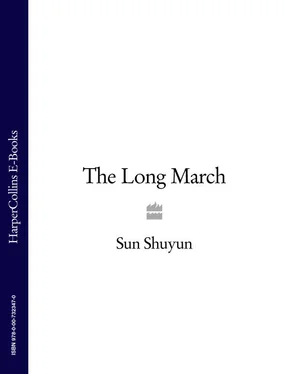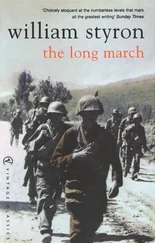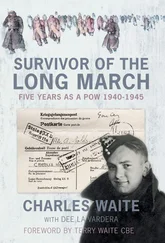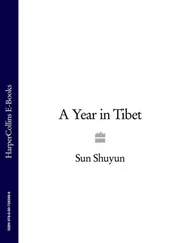Today the water buffalo had the pond to themselves, and only the village ancestor shrine opposite showed signs of life, but not with pious prayers and hypnotic chants offered to the ancestors: only the revolutionary song calling on young men to join the Red Army. Through the imposing entrance topped by grey-tiled eaves, boys carrying spears rushed in and out, looking solemn, as if they had been entrusted with the most important task of their lives. Two young women were putting a table and some benches outside the gate. As the song died away, more women came out, clutching shoes they were making out of cloth, calling their children, while others gathered up firewood from outside the gate, and went home to cook.
‘Nobody is too tired to sing! Keep up the good work!’ called Wang Quanyuan, the young woman who had just emerged from a house nearby. She had on a grey cotton jacket, the kind every soldier wore, tied with a rope round her waist, but its simplicity made her beauty stand out even more. She asked one woman to bring more benches, and then stopped one of the boys who was running by, and whispered something in his ear; nodding eagerly, he took to his heels.
Wang noticed the slogans on the white wall of the shrine, written in black ink but slightly washed out by the summer rain. ‘Down with the Landlords and Evil Gentry!’ ‘Long Live the Communists!’ ‘Long Live the Soviet!’ ‘I mustn't forget to tell them to repaint the slogans’, she murmured to herself, remembering that until four years ago she had no idea what Soviet was. Someone had told her that it was a foreign shop, and others said he was the brother of a famous Communist labour organizer. A warlord definitely thought so: he had posted a notice throughout the villages, offering a reward for the capture, dead or alive, of Mr Soviet. In the local dialect, Soviet was pronounced Su-wei-ai, which meant ‘we’, so perhaps the Soviet was our government, she once thought. Now she was actually working for the youth and women's departments of the Soviet, a government of workers and peasants that had been set up by Mao and his Red Army in southern Jiangxi in 1931. Small as it was, with barely three million people in half a dozen counties, hemmed in on all sides by Chiang Kaishek's Nationalist troops, the Jiangxi Soviet had all the functions of a state. Wang was told that the Communist Party was working to turn the whole of China into a Soviet. That would be the day, Wang smiled, but then became very solemn. ‘Everything hangs on tonight,’ she muttered to herself.
As darkness fell, the bell hanging from the camphor tree rang out. Four giant bamboo torches lit up the pond and the gate of the shrine hall. Women, and a few men, old and young, gathered with several hundred people from nearby villages, summoned by Wang's Red Pioneers. She had also sent for half a dozen militia men from the county Party headquarters; when they finally arrived, Wang stood up and delivered her speech:
‘Sisters and brothers, grandfathers and grandmothers, the Red Army is at its most critical time now, with many wounded every day. But in a war, there is always winning and losing. If we stop fighting just because we have lost a few battles, our Revolution will never succeed and we will always be exploited by the rich. You are strong. Do you want to be trampled on for the rest of your lives? If not, join the Red Army now!’
There was no reply.
Wang nodded to the militia men who were standing close by, and continued: ‘Don't be afraid. We will win. Use your brain. This village has hundreds of poor people, and only one or two landlords. Aren't we more powerful than them? All we need to do is to unite, but there is a traitor who does not want this to happen. He seems to care about you, telling you to keep your men at home, but if we all stay at home, our enemy will come, taking our land and raping our women. Is that what you want?’
‘Of course not!’ shouted the militia men.
‘Then let's bring the traitor out.’ Wang waved her hand. Two militia men appeared from behind the shrine gate, each holding the arm of a man, followed by a third with a pistol in his hand. Silence fell and the villagers looked at each other speechless. The accused was none other than the Party Secretary of their district, Mr Liu. Suddenly, a Red Pioneer raised his arm, shouting, ‘Down with the traitor! Kill the traitor!’
‘Tell me, what do you want done with him?’ Wang asked several times.
‘Kill him,’ yelled a militia man.
‘Kill him now!’ A chorus of voices followed.
Two shots at point blank range and Liu fell to the ground. Wang announced grimly: ‘This will be the fate of anyone who dares to sabotage the Revolution.’
It was hard to believe, when I met Woman Wang, that she had ever done such things, or suffered more than I could bear to think about. She had started as the quintessential supporter of the Revolution. Poverty had made her family sell her into a marriage which she did not want; joining the Communists represented hope. Chosen as one of only thirty women to go with the 1st Army among 86,000 men, she survived and rose to head the Red Army's only women's regiment. A year later, she was captured, raped and given to a Nationalist officer as a concubine – a ‘crime’ for which she was denounced by the Party, remaining under a cloud for the next fifty years. Still, she remained loyal to the Party, which she regarded as dearer to her than her parents. I remember thinking to myself after reading her biography: if there was ever a true Communist faithful, it must be Wang.
What better way to start my journey than by talking to her? I set out in October 2004, exactly seventy years after the Chinese Communist Party and the 1st Army abandoned their base in Jiangxi and began their escape from the Nationalists – the Long March as it became known. From Beijing I took the train, eighteen hours due south, and then after two hours more by bus through green-clad mountains and hills I found myself in Taihe in southern Jiangxi. It was a big town, with a grand new avenue, beautifully surfaced and complete with modern lighting – not many buildings yet, but looking for 21st-century growth. I wondered if I would have trouble finding Wang – after all Taihe had a population of half a million people and all I had was her biography, which I had been re-reading on the train. I took a rickshaw from the longdistance bus stop and mentioned Wang's name hesitantly; I was relieved when the driver told me to take it easy. ‘What a woman! How many went on the Long March from Jiangxi? 80,000? I guess not many of them are left today. Three in this town, and forty in Jiangxi. If you come next year, they will probably all be gone.’ He took me down the big avenue and then into the old quarter. Dusty, narrow, busy and crowded, just like the photographs of provincial towns in the 1930s. I was dropped off next to a dumpling shop with a queue of hungry customers. Behind it was Wang's courtyard, shaded by a pomegranate tree with its dark red fruit just bursting open. Beneath it, there she sat, looking gentle, serene and elegant, belying her 91 years, and without a trace of the toughness of the Red Army commander.
She was not surprised to see me, a complete stranger, walking in off the street and wanting to find out about her past. My copy of her biography was a good enough introduction. She asked me to sit down and called, ‘Another visitor from Beijing!’ A middle-aged woman came out. From what I had read, I assumed she was her adopted daughter – Wang was unable to conceive after the Long March. ‘You shouldn't ask too many questions, she gets too excited. Last week we had a journalist from Beijing, and she talked so much, it made her ill. Anyway, it is all in there,’ she said, referring to the book on my lap. Wang cut her short. ‘They think talking is a waste of breath, but they don't understand. So many men and women died for the good life we live today and I want people to remember that.’ She sent her daughter back inside for another biography, written by a local Party historian. ‘You might not have come across it.’
Читать дальше







![Джеффри Арчер - The Short, the Long and the Tall [С иллюстрациями]](/books/388600/dzheffri-archer-the-short-the-long-and-the-tall-s-thumb.webp)




